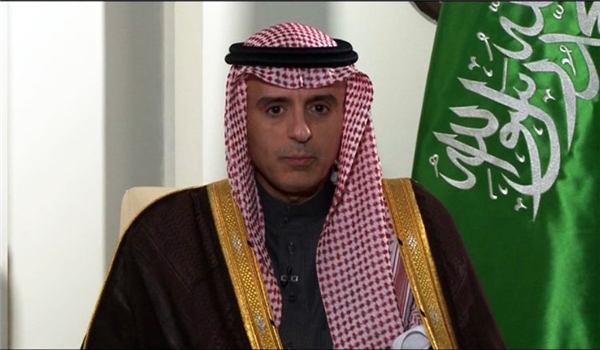
Arab Daily: S. Arabia Changing Anti-Syria Policy by Sacking Al-Jubeir, Demanding Iraq's Mediation

The Arabic-language al-Ajel news website said different issues, including the
crises in Qatar and Yemen and the anti-ISIL victories in Iraq and Syria, have
made the Saudi regime review its calculations and plans to gradually change its
policies.
Meantime, secret information indicates that Saudi Crown Prince Mohammed bin
Salman seeks to replace al-Jubeir with prince Khalid bin Salman, the current
Saudi ambassador to the US, it added.
According to the Syrian website, al-Jubeir played a leading role in Saudi
Arabia's anti-Shiite policies and he has several times criticized Iran for
religious reasons, stressing that he will be the victim of Riyadh's altering
views and stance to improve relations with Tehran.
Earlier this month, an Iraqi minister said that Saudi Arabia has asked Baghdad
to play a mediatory role between Riyadh and Tehran to resume bilateral
relations.
Iraqi Interior Minister Qassim al-Araji, who was on a visit to Saudi Arabia
recently, announced that the Saudi officials have urged the government of Prime
Minister Haider al-Abadi to mediate between Riyadh and Tehran.
"Mohammed bin Salman (the Saudi crown prince) officially demanded me that Iraq
mediate between Iran and Saudi Arabia to reduce tensions. King Salman had also
earlier raised such a demand. We believe that friendly relations between Iran
and Saudi Arabia will help the regional security," al-Araji said in a meeting
with his Iranian counterpart Abdolreza Rahmani Fazli in Tehran.
Saudi Arabia severed diplomatic relations with Iran in January 2016 following
demonstrations held in front of its embassy in Tehran and its consulate in
Mashhad by angry protesters censuring the Al Saud family for the execution of
prominent Shiite cleric Sheikh Nimr al-Nimr in Riyadh on January 2.
Nimr’s execution caused international outrage and sparked anti-Saudi
demonstrations in many other countries.
Riyadh has been attempting to rock the boat in relations between Iran and other
world states and has spared no efforts to pressure Tehran.
In April 2017, Iranian President Hassan Rouhani took Saudi Arabia responsible
for the darkened relations between the two countries, saying that the root cause
of Riyadh's hostile behavior should be found in its failures in Syria and Yemen.
"The fault is not on us but the distance has been created by them (the Saudis),"
Rouhani told reporters in a press conference in Tehran.
He referred to the tragic Mina incident on 24 September 2015, the execution of
prominent cleric Sheikh Nimr al-Nimr by Saudi Arabia in January 2016 and the
angry people's attack against the Saudi embassy in Tehran (which was condemned
by the Iranian officials), and said, "Apparently, Saudi Arabia had prepared
itself for an incorrect behavior towards Iran whose root cause, I personally
think, can be traced in its failures in Syria and Yemen."
He, meantime, underscored Iran's readiness to improve ties with Riyadh, and
said, "I hope that Saudi Arabia will stop its incorrect (military) operation
against Yemen, which certainly prevents improvement of relations (with Iran)."















